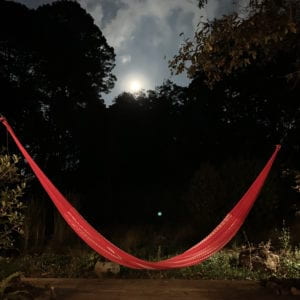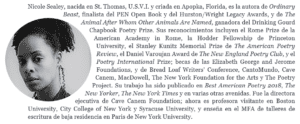Por: Nicole Sealey
Traducción de Lucía Orellana Damacela

Foto: Alberto Kritzler
a violence
You hear the high-pitched yowls of strays
fighting for scraps tossed from a kitchen window.
They sound like children you might have had.
Had you wanted children. Had you a maternal bone,
you would wrench it from your belly and fling it
from your fire escape. As if it were the stubborn
shard now lodged in your wrist. No, you would hide it.
Yes, you would hide it inside a barren nesting doll
you’ve had since you were a child. Its smile
reminds you of your father, who does not smile.
Nor does he believe you are his. “You look just like
your mother,” he says, “who looks just like a fire
of suspicious origin.” A body, I’ve read, can sustain
its own sick burning, its own hell, for hours.
It’s the mind. It’s the mind that cannot.
una violencia
Oyes el aullido de los vagabundos
que se pelean por sobras lanzadas desde la ventana de una cocina.
Suenan como los niños que pudiste haber tenido.
Si hubieras querido hijos. Si hubieras tenido un hueso de instinto maternal,
lo hubieras arrancado de tu vientre y arrojado
por la escalera de incendios. Como si fuera el obstinado
fragmento incrustado en tu muñeca. No, tú lo ocultarías.
Sí, lo ocultarías dentro de la matrioska vacía
que has tenido desde que eras una niña. Su sonrisa
te recuerda a tu padre, que no sonríe.
Ni tampoco cree que eres de él. “Eres igual
a tu madre”, dice él, “tu madre, que es igual a un fuego
de origen sospechoso”. Un cuerpo, he leído, puede soportar
su propia quemazón enferma, su propio infierno, por horas.
Es la mente, es la mente la que no puede.
candelabra with heads
Had I not brought with me my mind
as it has been made, this thing,
this brood of mannequins, cocooned
and mounted on a wooden scaffold,
might be eight infants swaddled and sleeping.
Might be eight fleshy fingers on one hand.
Might be a family tree with eight pictured
frames. Such treaties occur in the brain.
Can you see them hanging? Their shadow
is a crowd stripping the tree of souvenirs.
Skin shrinks and splits. The bodies weep
fat the color of yolk. Can you smell them
burning? Their perfume climbing
as wisteria would a trellis.
as wisteria would a trellis.
burning? Their perfume climbing
fat the color of yolk. Can you smell them
Skin shrinks and splits. The bodies weep
is a crowd stripping the tree of souvenirs.
Can you see them hanging? Their shadow
frames. Such treaties occur in the brain.
Might be a family tree with eight pictured
Might be eight fleshy fingers on one hand.
might be eight infants swaddled and sleeping.
and mounted on a wooden scaffold,
this brood of mannequins, cocooned
as it has been made, this thing,
Had I not brought with me my mind
Who can see this and not see lynchings?
candelabra con cabezas
Si no hubiera traído mi mente conmigo
como está hecha, esta cosa,
esta prole de maniquíes, encapullados
y montados en un andamio de madera,
podrían ser ocho infantes envueltos y dormidos.
Podrían ser ocho dedos carnosos en una mano.
Podría ser un árbol genealógico con ocho fotos
en marcos. Los arreglos que ocurren en el cerebro.
¿Los ves ahí colgando? Su sombra
es una horda saqueando recuerdos a los árboles.
La piel se encoje y se parte. El cuerpo supura
grasa color yema. ¿Los hueles ahí
quemándose? Su perfume trepa
como glicinas en espalderas.
como glicinas en espalderas.
quemándose? Su perfume trepa
grasa color yema. ¿Los hueles ahí
La piel se encoje y se parte. El cuerpo supura
es una horda saqueando recuerdos a los árboles.
¿Los ves ahí colgando? Su sombra
en marcos. Los arreglos que ocurren en el cerebro.
Podría ser un árbol genealógico con ocho fotos
Podrían ser ocho dedos carnosos en una mano.
podrían ser ocho infantes envueltos y dormidos.
y montados en un andamio de madera,
esta prole de maniquíes, encapullados
como está hecha, esta cosa,
Si no hubiera traído mi mente conmigo
¿Quién puede ver esto y no ver linchamientos?
instead of executions,
think death erections
I wish the day hadn’t.
Dawn has claimed
another sky, its birds.
I watch from my burning
stake the broken necks.
Once, this lot
allowed wildflowers₋
nothing worse than bruised
wildflowers. Darling
dawn, death mask
to which I’ve grown
accustomed, show me
one pretty thing
no heavier
than a hummingbird.
en vez de ejecuciones,
piensa erecciones muertas
Ojalá el día no hubiera.
El amanecer ha reclamado
un cielo más, sus pájaros.
Miro desde mi ardiente
hoguera los cuellos rotos.
Alguna vez, este lote
acogió flores silvestres₋
nada peor que flores silvestres
magulladas. Querido
amanecer, máscara de muerte
a la que me he
acostumbrado, enséñame
algo bonito
no más pesado
que un colibrí.
object permanence
[for John]
We wake as if surprised the other is still there,
each petting the sheet to be sure.
How have we managed our way
to this bed–beholden to heat like dawn
indebted to light. Though we are not so self-
important as to think everything
has led to this, everything has led to this.
There’s a name for the animal
love makes of us–named, I think,
like rain, for the sound it makes.
You are the animal after whom other animals
are named. Until there’s none left to laugh,
days will start with the same startle
and end with caterpillars gorged on milkweed.
O, how we entertain the angels
with our brief animation. O,
how I’ll miss you when we’re dead.
la permanencia del objeto
[para John]
Nos despertamos como sorprendidos de que el otro siga aquí
cada uno palpando las sábanas para estar seguros
Cómo nos las hemos arreglado para llegar
a esta cama–endeudados con el calor como el amanecer
con la luz. Aun cuando no somos tan
vanidosos de pensar que todo
ha conducido a esto, todo ha conducido a esto.
Hay un nombre para el animal
que el amor hace de nosotros– nombrado, pienso
como la lluvia, por el sonido que hace.
Eres el animal por el cual otros animales
son nombrados. Hasta que no haya nadie para reir,
los días empezarán con la misma sorpresa
y terminarán con orugas hartadas en asclepsias.
O, cómo entretenemos a los ángeles
con nuestra breve animación. O,
cómo te voy a extrañar cuando estemos muertos.
Nota
Estos poemas forman parte del poemario Ordinary Beast (Ecco, 2017).
“Candelabra with heads”: 2006, Thomas Hirschhorn, part of the Tate Collection. The poem is written in a form created by the author called Obverse. The poem’s second half is written in the reverse order of the first and the last line is the “thesis question” of the poem.
“Candelabra con cabezas”: 2006, Thomas Hirschhorn, parte de la colección Tate. El poema es escrito en una forma creada por la autora, llamada Anverso. La segunda mitad del poema es escrita en el orden inverso a la primera, y la última línea es la “pregunta de la tesis” del poema.
“Object Permanence”: Object permanence is the understanding that objects continue to exist even when they cannot be observed.
“La permanencia del objeto”: La permanencia del objeto es el entendimiento de que los objetos continúan existiendo incluso cuando no se los puede observar.

